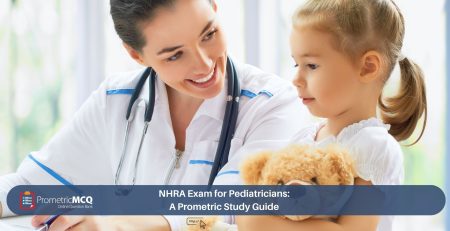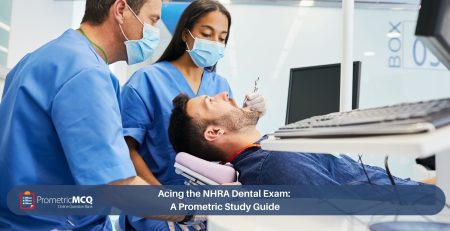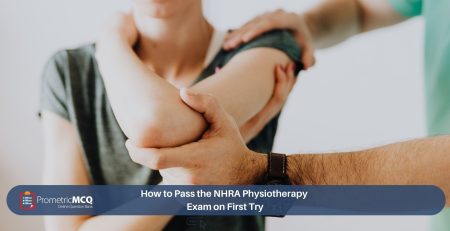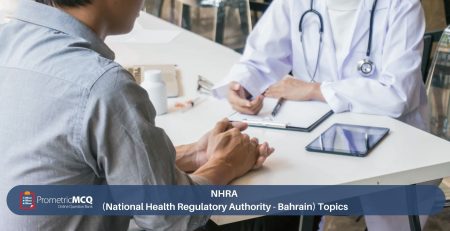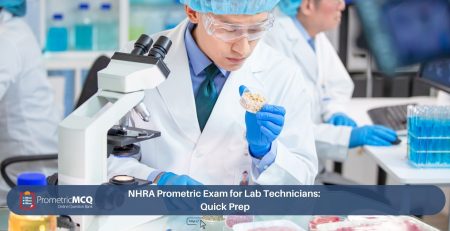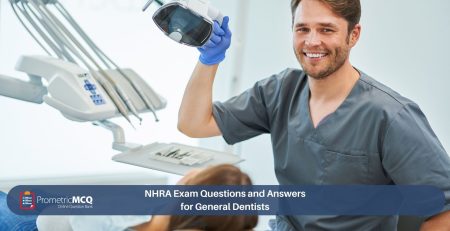
More Profession-Specific Topics
fatima@prometricmcq.com2025-09-29T23:44:23+00:00Table of Contents
ToggleNHRA Bahrain Exam: A Guide for All Healthcare Professions (2025)
The Kingdom of Bahrain’s National Health Regulatory Authority (NHRA) stands as a vigilant guardian of healthcare quality, ensuring that every professional practicing within its borders meets a stringent, internationally recognized standard of excellence. For any healthcare worker—whether you are a doctor, nurse, dentist, pharmacist, or allied health professional—the NHRA licensure exam is the definitive gateway to a career in Bahrain’s advanced and rapidly growing health sector. While each profession has its unique body of knowledge, the philosophy and structure of the NHRA Prometric exams share a common, rigorous framework.
Understanding this framework is the first step toward demystifying the exam and building a successful preparation strategy. These are not academic tests of memorization but sophisticated assessments of your ability to apply clinical knowledge, exercise sound judgment, and prioritize patient safety in realistic, case-based scenarios. Acing the NHRA exam requires a strategic approach that goes beyond simply reviewing textbooks; it demands active engagement with the material through high-quality, profession-specific Multiple-Choice Questions (MCQs).
This ultimate 2025 guide provides a comprehensive, multi-professional overview of the NHRA licensure exams. We will first explore the universal pattern and structure applicable to all candidates, and then dive deep into the specific high-yield syllabus topics and question styles for each major healthcare profession. Complete with sample questions and a robust 10-point FAQ section, this guide is your all-in-one resource for navigating the NHRA exam process with clarity and confidence.
Key Takeaways for All NHRA Exams
- Universal Format: All exams are Computer-Based Tests (CBTs) administered by Prometric, consisting of MCQs.
- Standard Structure: Most exams have 150 questions to be completed in 3 hours.
- No Negative Marking: It is always to your advantage to answer every question.
- Clinical Application is Key: The exams test your ability to apply knowledge to patient scenarios, not just recall facts.
- Profession-Specific Focus: While the pattern is similar, the content is highly tailored. Your preparation must be specific to your profession.
The Universal NHRA Exam Pattern
Before delving into profession-specific details, it’s crucial to understand the common architecture of all NHRA exams. This knowledge is foundational to your Bahrain NHRA exam preparation.
Core Framework
- Administrator: All NHRA exams are conducted at secure, standardized Prometric test centers located worldwide.
- Format: The exams are 100% MCQ-based. There are no essay or practical components.
- Duration & Pacing: The standard 150-question, 3-hour format provides an average of 1 minute and 12 seconds per question. This necessitates efficient time management.
- Scoring: You will receive a simple Pass/Fail result. The unofficial passing threshold for most professions is around 60-65%.
Profession-Specific Syllabus & Question Breakdown
Now, let’s explore the high-yield topics and unique focus areas for each major healthcare profession.
1. For General Practitioners (GPs)
The GP exam is a broad assessment of the knowledge required for primary care.
- Core Focus: Diagnosis, management, and appropriate referral of common conditions across all age groups.
- Syllabus Deep Dive: Internal Medicine (~50-60%) is the largest domain, covering the management of chronic diseases like hypertension, diabetes, and asthma. Pediatrics (~15-20%) focuses on common infections and developmental milestones. Obstetrics & Gynecology (~10-15%) covers routine antenatal care and common GYN issues. Surgery & Emergency Medicine (~10%) tests the recognition of acute conditions.
GP Sample Question: A 60-year-old male with a history of COPD presents with increased dyspnea and a change in sputum color to green. His oxygen saturation is 90% on room air. According to GOLD guidelines, what is the most appropriate initial management?
- Administer intravenous methylprednisolone.
- Start an oral course of amoxicillin-clavulanate.
- Increase his long-acting beta-agonist (LABA) dose.
- Obtain a chest X-ray and sputum culture before starting treatment.
Correct Answer: B. This patient presents with the three cardinal symptoms of an acute exacerbation of COPD (increased dyspnea, increased sputum volume, and sputum purulence). This indicates a likely bacterial cause, and guidelines recommend starting empiric antibiotics. Amoxicillin-clavulanate is an appropriate choice. Systemic steroids (A) are also indicated, but antibiotics are crucial. Increasing the LABA (C) is insufficient, and delaying treatment for diagnostics (D) is inappropriate in an acute exacerbation.
2. For Nurses
The nursing exam is heavily weighted towards patient safety and clinical decision-making.
- Core Focus: Application of the nursing process (ADPIE), prioritization of care, patient safety, and delegation.
- Syllabus Deep Dive: Medical-Surgical Nursing is the largest component, focusing on the care of adults with common health problems. Fundamentals of Nursing covers ethics, legal aspects, and core skills. Patient Safety is a theme woven throughout, including medication administration rights and infection control protocols.
Nurse Sample Question: A nurse is caring for a patient receiving a blood transfusion. 15 minutes into the transfusion, the patient complains of lower back pain, chills, and has a fever. What is the nurse’s priority action?
- Administer an antipyretic for the fever.
- Notify the physician immediately.
- Stop the transfusion immediately.
- Check the patient’s vital signs.
Correct Answer: C. The patient is exhibiting classic signs of an acute hemolytic transfusion reaction, a life-threatening emergency. The absolute first and most critical action is to stop the transfusion immediately to prevent any more incompatible blood from entering the patient’s system. While notifying the physician (B) and checking vital signs (D) are also essential, they must be done *after* stopping the infusion.
3. For Dentists
The dental exam focuses on diagnosis, treatment planning, and radiographic interpretation.
- Core Focus: Diagnosis of oral diseases, comprehensive treatment planning, dental materials, and local anesthesia.
- Syllabus Deep Dive: Restorative Dentistry and Endodontics form the largest block. Oral Surgery and Radiology are also heavily tested, requiring excellent diagnostic skills. A solid understanding of Periodontics, Prosthodontics, and Pedodontics is also essential. For more details, explore our guide on the Prometric dental licensing exam.
Dentist Sample Question: A periapical radiograph of a non-vital maxillary lateral incisor shows a well-defined, corticated radiolucency at the apex. What is the most likely diagnosis?
- Periapical abscess
- Periapical granuloma
- Radicular cyst
- Cementoblastoma
Correct Answer: C. A radicular (or periapical) cyst is the most common odontogenic cyst. It arises from the epithelial rests of Malassez in the PDL in response to inflammation from a non-vital tooth. Radiographically, it typically presents as a well-defined, round or oval radiolucency with a distinct, corticated (white) border. A granuloma (B) is usually less defined, and an abscess (A) is typically ill-defined and associated with acute symptoms.
4. For Pharmacists
The pharmacy exam is a rigorous test of clinical therapeutics, calculations, and pharmacy practice.
- Core Focus: Pharmacotherapy, pharmaceutical calculations, and local Bahraini pharmacy laws and regulations.
- Syllabus Deep Dive: Clinical Therapeutics is the largest section, requiring deep knowledge of guideline-based disease management. Pharmaceutical Calculations must be mastered with 100% accuracy. A unique feature is the testing of Bahrain-specific regulations for dispensing controlled substances.
Pharmacist Sample Question: A patient presents a prescription for warfarin 5 mg. Upon review of their profile, you see they were just prescribed trimethoprim-sulfamethoxazole for an infection. What is the potential interaction and your recommendation?
- Increased risk of thrombosis; recommend adding aspirin.
- Decreased warfarin effect; recommend increasing the warfarin dose.
- Increased risk of bleeding; recommend contacting the physician to consider an alternative antibiotic.
- No significant interaction.
Correct Answer: C. This is a major, clinically significant drug interaction. Trimethoprim-sulfamethoxazole is a potent inhibitor of the CYP2C9 enzyme, which metabolizes warfarin. This interaction can cause a sharp and dangerous increase in the patient’s INR, leading to a high risk of major bleeding. The pharmacist has a duty to identify this and contact the prescriber to suggest an alternative antibiotic with no such interaction.
Frequently Asked Questions (FAQs) for the NHRA Exam
The NHRA provides a Pass/Fail result and does not disclose a numerical score or percentage. However, the unofficial passing standard for most professions is considered to be in the 60-65% range. Aiming for 70-75% in practice tests is a safe strategy.
The process begins with an online application through the NHRA’s National Health Information System (I-SEHA). You will submit your documents and, once deemed eligible, you will receive an eligibility number to book your exam with Prometric.
Yes, absolutely. The NHRA exams are based on the latest international, evidence-based best practices. You should study guidelines from major, globally recognized bodies relevant to your profession (e.g., AHA for cardiology, ADA for dentistry). For an overview of international health standards, you can refer to the World Health Organization (WHO).
Primary Source Verification (PSV) by the DataFlow Group is a mandatory verification of your credentials (degree, license, experience). The NHRA requires a positive PSV report before they will issue your license to practice. It is a separate process from the exam and should be started early.
Typically, candidates are allowed three attempts to pass the exam. There are specific rules regarding the waiting period between attempts. A failure should prompt a significant change in your study strategy, focusing more on active MCQ practice.
The consensus among successful candidates is that the most critical study tool is a high-quality, profession-specific question bank (QBank). This active learning approach, focused on solving and reviewing thousands of MCQs, is superior to passive reading for mastering the clinical reasoning skills tested on the exam.
After passing the exam, your result is typically valid for one year. You must complete the remaining licensing requirements and activate your license with an employer within this period.
The only essential item is your original, valid passport. The name must match your registration exactly. All other items, including watches, phones, and bags, must be stored in a locker provided by the Prometric center.
Yes, Prometric allows you to reschedule your exam, but there are strict rules and potential fees depending on how far in advance you make the change. Be sure to check the specific policy on the Prometric website when you book your exam.
Finding a resource that provides high-quality, relevant practice questions is key. A comprehensive platform that offers dedicated QBanks for various specializations is your best asset for effective preparation. You can browse a wide range of options on the MCQs Packages page.
Conclusion: Your Unified Path to a Career in Bahrain
The NHRA licensure exam, while challenging, is a standardized and fair assessment of the skills required to be a competent and safe healthcare provider. By understanding the universal exam pattern and focusing your preparation on the high-yield topics specific to your profession, you can build a highly effective study plan. Center your strategy on active learning with high-quality MCQs, and you will be well-equipped to pass your exam and embark on a successful and rewarding career in the Kingdom of Bahrain’s esteemed healthcare sector.
Ready to Master Your Specialty and Ace Your NHRA Exam?
Our comprehensive MCQ packages are tailored for every major healthcare profession, providing thousands of high-yield questions, detailed rationales, and simulated exams to build your knowledge and guarantee your success.

